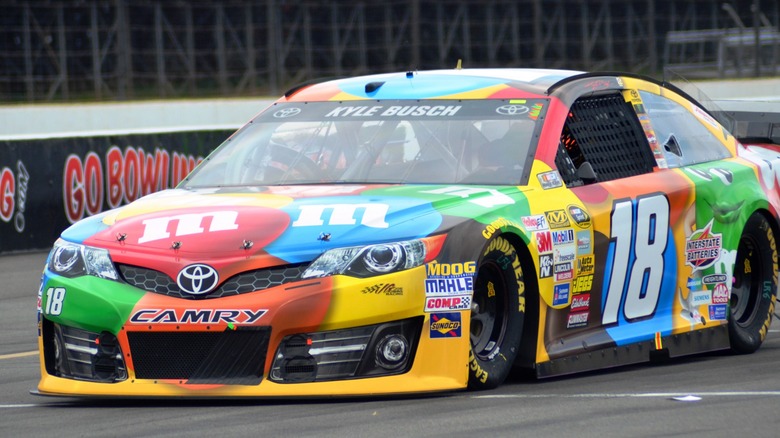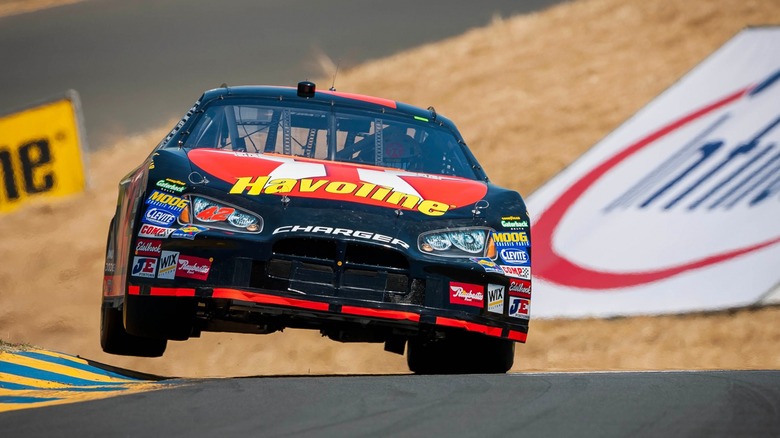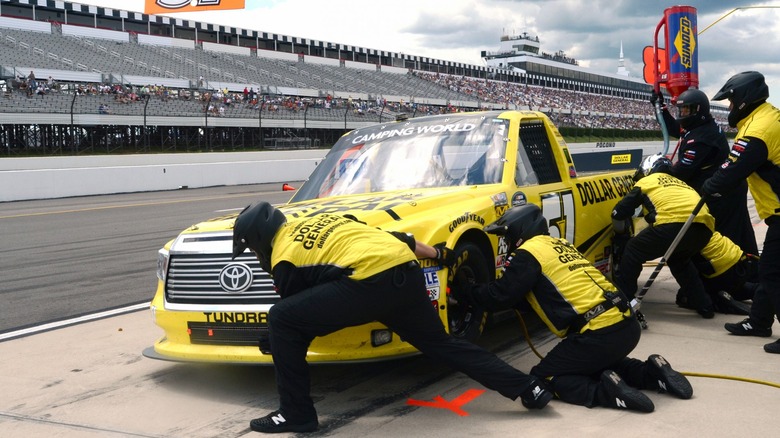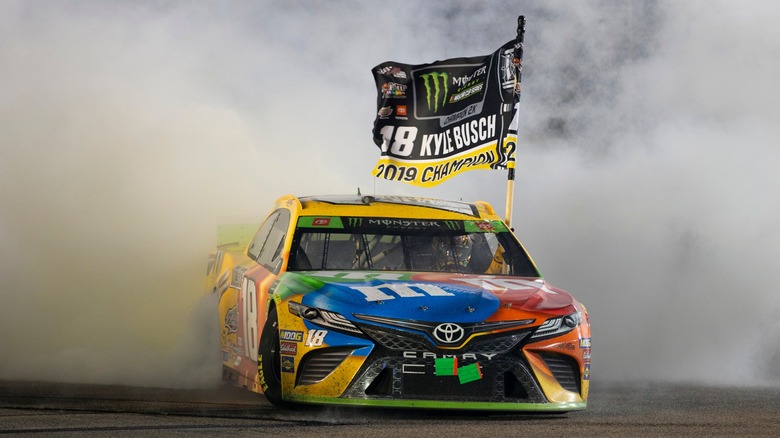Here's How Toyota Got Its Start In NASCAR (And How Successful It Has Been)
Since its inception in February 1948, NASCAR has catered to American car manufacturers. Lincoln, Oldsmobile, and Plymouth, all divisions of American car manufacturers, rounded out the inaugural season, with names like Chevy, Dodge, Buick, and Pontiac joining the winner's circle in the years following.
Throughout NASCAR's lengthy and ongoing run, foreign brands were peppered throughout. Representation came primarily from the United Kingdom, with manufacturers like Austin-Healey, Aston Martin, Jaguar, and Leyland Motors joining the roster throughout the 50s and early 60s. In 1963, MG Motor became the last foreign brand to run a NASCAR race. That is until 2007, when a newcomer rolled onto the track, ready to make a name for itself in the American sport.
Chevrolet and Ford may lead the pack in total championship victories, with Chevy topping the charts at over 70 career wins across all NASCAR series, but rounding out the top three, just a few victories behind Ford, sits Toyota, the foreign brand that shook up one of the United States' largest spectator sports.
Toyota Enters the Race
First introduced to consumers in 1983, the Toyota Camry sported a modest 2.0L four-cylinder engine. It was a quaint commuter vehicle sporting hard lines and the boxy aesthetic common throughout the 1980s. At no point during its initial production could someone look at the Camry and assume, 24 years later, it would be equipped with a V-8, going toe-to-toe with two of the most notable American car brands.
Why Toyota joined NASCAR's 2007 season can be a matter of debate, though the marketing opportunity can't be overlooked. The decision clearly wasn't one made on a lark. Despite ending the 2007 NASCAR Nextel Cup Series with zero wins across its eight drivers, the Japanese manufacturer revisited the idea of racing in 2008 and took part in the 2008 NASCAR Sprint Cup Series. By the season's close, Toyota had scored 10 driver wins, the bulk of which were attributed to Joe Gibbs Racing driver Kyle Busch.
Unsurprisingly, Toyota's initial success riled fans, but no backlash was enough to drive the NASCAR newcomer away from the potential for success. Before long, its name was all over the NASCAR track.
Toyota's Ongoing Success
Though the Camry first graced the American track in 2007, the more popular Cup series wasn't actually the brand's first run in an official NASCAR race. In 2006, Toyota sponsored five different teams for the NASCAR Craftsman Truck Series, with drivers getting behind the wheel of a Tundra Milwaukee. Since the 2006 run, Toyota trucks have dominated the leaderboard, securing 13 championships through 2022.
Back in the traditional cup series, the Camry continued to fair well after its 2008 victories. In the following years, Kyle Busch led the manufacturer to the finish line, securing four checkered flags in 2009 and sweeping the boards in the Cup, Xfinity, and Truck Series in 2010. For as successful as it had been in the Cup series, it wasn't until 2016 that the Japanese manufacturer took home a championship win with Jimmie Johnson driving the 2015 update of the Camry.
Toyota's drivers earned two more championship victories in 2017 and 2019. Similar results were also seen in NASCAR's Xfinity Series, where Toyota's Supra secured four Manufacturer's championships in 2008, 2009, 2010, and 2016.
The Future of Toyota Racing in NASCAR
Despite the initial fan reaction and early complaints over Toyota's foreign origin, the Japanese manufacturer slowly earned respect for being a formidable competitor. It plans on continuing to be one, and for the 2024 Cup season, will return to the track with a redesign of its classic Camry.
The XSE race car is a sleek upgrade to the successful TRD Next Gen, with a body closely replicating the 2025 Toyota Camry XSE. Along with an updated body, the XSE sports a hammerhead-styled front facia that contrasts the more subtle rear facia and its chamfered bumper and new quarter panel styling.
Considering Toyota's record with the TRD Next Gen, the manufacturer will likely continue to be a stark competitor. While it lags in championship wins, largely because it came onto the scene many years after NASCAR started running, the Camry redesign is sure to reinvigorate the team's drivers to secure more checkered flags.



